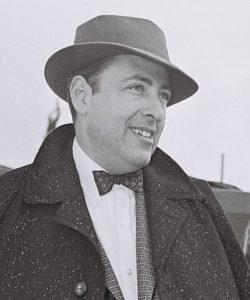By Amy Neustein, PhD

(Wikipedia photo)
FORT LEE, New Jersey — My late mother, Shirley Friedberg Neustein, was a childhood friend of Herman Wouk, who attended the boys division of a Zionist camp (Keeyuma/Carmelia) in the 1920s and 30s, which was picturesquely situated on Lake Champlain in Milton Vermont. They kept up until my mother died in 2001.
I gathered bits and pieces of Herman’s personal side, his banter, humor, zest for living in spite of personal tragedy, from the anecdotes my mother shared with me. Beginning with the camp days, where the boys and girls who were separated during the week would come together for Friday night Shabbat prayer service, my mother was very much intrigued with Herman, a couple of years her senior. She vividly described how during short breaks in the prayer service he would suddenly lift his head from the Siddur, canvassing the room with penetrating eyes. She would often tell me she could see “the wheels of his mind” turning as he scrupulously examined every fellow camper in the prayer hall. They all wore white shorts for the Sabbath, as was required by the camp director. Yet behind the banality of clothing, Herman saw the richness of color in each fellow camper.
He soon became friends with my mother, and when he invented the character “Shirley” in Marjorie Morningstar he called my mother to apologize profusely, swearing she was nothing at all like the protagonist in his book! Though he did concede he consciously used her name because of his friendship with my mother, another “Shirley.”
In May 1962, my mother put together a monumental camp reunion, bringing together the Zionist youths that had now become household names in literary, political and business circles. Arthur Miller, Norman Lear, Moss Hart, Paul Goodman, Bob Treuhaft, Andrew Goodman (founder of Bergdorf Goodman), just to name a few. Herman was immersed at the time in Youngblood Hawke, secluding himself in the Virgin Islands so as to devote full concentration to his novel. Unable to appear at the reunion, Herman made a poignant audiotape recounting his camp memories. My mother brought a scissors with her, and out of respect for Herman’s sensitivity she cut the cassette tape immediately after it was played. The room stood still, as the former campers listened closely to Herman’s reflections on his camp days: stories, commentaries, and humor about life among an oasis of trees for a Jewish boy growing up in the Bronx.
Many will say Herman, an extraordinarily gifted Pulitzer Prize winning novelist, was “larger than life.” My late mother would say, if she were here today, Herman was someone who clearly showed signs of “greatness” as a young lad even before he ever took pen to hand to write his first novel!
Neustein is author of Tempest in the Temple and From Madness to Mutiny.
I am an avid reader and great fan of Herman Wouk, and was so happy to see this op-ed in his memory appear in the San Diego Jewish World. Coincidentally I also knew Shirley Friedberg Neustein from my days in the news business! I was the personal assistant to several high profile political columnists at the New York Post in the late 80s and 90s. I spoke to Shirley on numerous occasions and had the privilege of hearing her testify before the New York State Legislature. She was a passionate advocate of mothers and children and tried very hard to educate legislators about the trauma of placing children in foster homes. She was so full of life and so caring. I remember her telling me of her camp days and how inspired she was to be at such a special camp. She told me the camp was a reservoir of talent, so much so that in her mid years she fulfilled a promise she made to herself while recovering from a serious illness to have a camp reunion. She brought together great minds and great people. Herman Wouk was certainly in good company at that camp, and with a friend like Shirley!
I’m Catholic and 49. Mr. Wouk has been my favorite author since about the age of 12. I’ve been fascinated by him so much that I own copies of every novel he has ever written, as well as the book versions of his plays. Wherever possible, I also own digital versions so that I can conveniently read them as i go about my life. God rest his soul.
Fascinating! It brings to mind my own contact with the great writer, although mine was just a one-time occurrence. I asked him to write a foreword or at least a blurb for my book on Rabbi Herbert S. Goldstein, The Maverick Rabbi. Mr. Wouk wrote that he had a policy not to read such books because he might unconsciously plagiarize, but he wrote a blurb ABOUT the rabbi which I was thrilled to place on an inside flap of the book.
Aaron Reichel